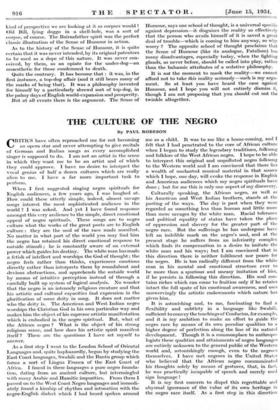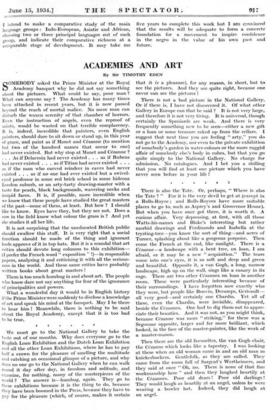THE CULTURE OF THE NEGRO
By PAUL ROBESON
CRITICS have often reproached me for not becoming an opera star and never attempting to give recitals of German and Italian songs as every accomplished singer is supposed to do. I am not an artist in the sense in which they want me to be an artist and of which they could approve. I have no desire to interpret the vocal genius of half a dozen cultures which are really alien to me. I have a far more important task to perform.
When I first suggested singing negro spirituals for English audiences, a few years ago, I was laughed at. How. could these utterly simple, indeed, almost savage songs interest the most sophisticated audience in the world ? I was asked. And yet I have found response amongst this very audience to the simple, direct emotional appeal of negro spirituals. These songs' are to negro culture what the works of the great. poets are to English culture : they are the soul of the race made manifest. No matter in what part of the world you may find him the negro has retained his direct emotional response to outside stimuli ; he is constantly aware of an external power which guides his destiny. The white man has made a fetish of intellect and worships the God of thought ; the negro feels rather than thinks, experiences emotions directly rather than interprets them by roundabout and devious abstractions, and apprehends the outside world by means of intuitive perception instead of through a carefully built up system of logical analysis. No wonder that the negro is an intensely religious creature and that his artistic and cultural capacities find expression in the glorification of some deity in song. It does not matter who the deity is. The American and West Indian negro worships the Christian God in his own particular way and makes him the object of his supreme artistic manifestation which is embodied in the negro spiritual. But, what of the African negro ? What is the object of his strong religious sense, and how does his artistic spirit manifest itself ? These arc the questions I have set myself to answer.
As a first step I went to the London School of Oriental Languages and, quite haphazardly, began by studying the East Coast languages, Swahili and the Bantu group which forms a sort of Lingua Franca of the East Coast of Africa. I found in these languages a pure negro founda- tion, dating from an ancient culture, but intermingled ith many Arabic and Hamitic. impurities. From them I passed on to the West Coast Negro languages and immedi- ately found a kinship of rhythm and intonation with the negro-English dialect which I had heard spoken around me as a child. It was to me like a home-coming, and I felt that I had penetrated to the core of African culture when I began to study the legendary traditions, folksong and folklore of the West African negro. I hope to be able to interpret this original and unpolluted negro folksong to the Western world and I am convinced that there lies a wealth of uncharted musical material in that source which I hope, one day, will evoke the response in English and American audiences which my negro spirituals have done ; but for me this is only one aspect of my, discovery.
Culturally speaking, the African negro, as well as his American and West Indian brothers, stands at the parting of the ways. The day is past when they were regarded as something less than human and little more than mere savages by the white man. Racial tolerance and political equality of status have taken the place of oppression and slavery for the greater part of the negro race. But the sufferings he has undergone have left an indelible mark on the negro's soul, and at the present stage he suffers from an inferiority complex which finds its compensation in a desire to imitate the white man and his ways; but I am convinced that in this direction there is neither fulfilment nor peace for the negro. He is too radically different from the white man in his mental and emotional structure ever to be more than a spurious and uneasy imitation of him, if he persists in following this direction. His soul con- tains riches which can come to fruition only if he retains intact the full spate of his emotional awareness, and uses unswervingly the artistic endowments which nature has given him.
It is astonishing and, to me, fascinating to find a flexibility and subtlety in a language like Swahili, sufficient to convey the teachings of Confucius, for example, and it is my ambition to make an effort to guide the negro race by means' of its own peculiar qualities to a higher degree of perfection along the line of its natural development. Though it is a commonplace to anthropo- logists these qualities and attainments of negro languages are entirely unknown to the general public of the Western world and, astonishingly enough, even to the negroes themselves. I have met negroes in the United States who believed that the African negro communicated his thoughts solely by means of gestures, that, in fact, he was practically incapable of speech and merely used sign language !
It is my first concern to dispel this regrettable and abysmal ignorance of the value of its own heritage in the negro race itself. As a first step in this direction I intend to make a comparative study of the main language groups : Indo-European, Asiatic and African, choosing two or three principal languages out of each group, and indicate their comparative richness at a comparable stage of development. It may take me five years to complete this work but I am convinced that the results will be adequate to form a concrete foundation for a • movement to inspire confidence in the negro in the value of his own past and future.

















































 Previous page
Previous page